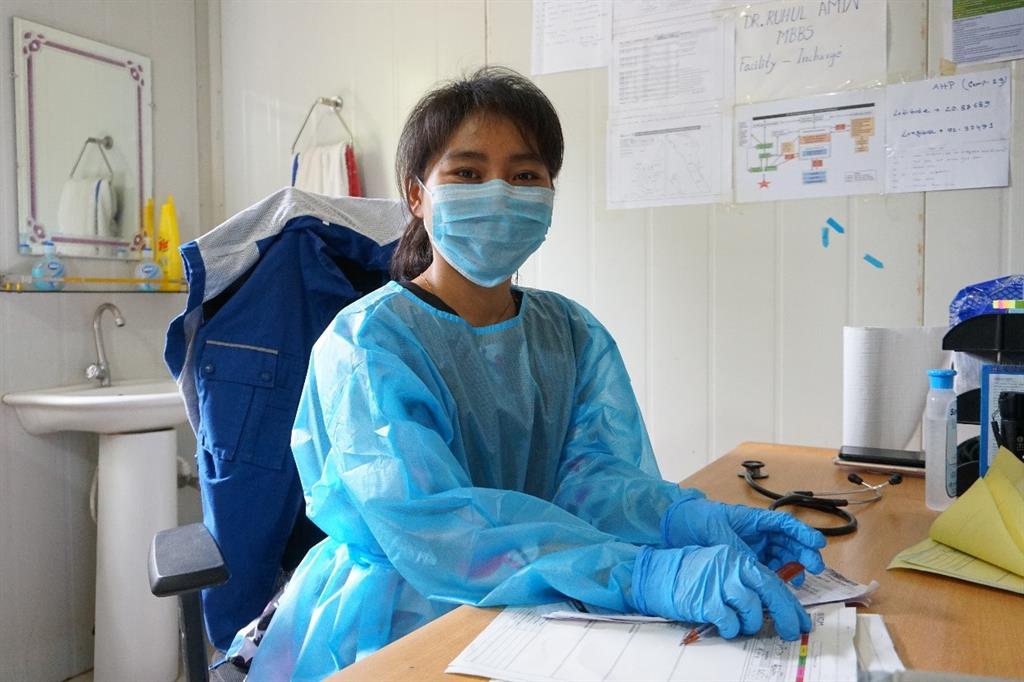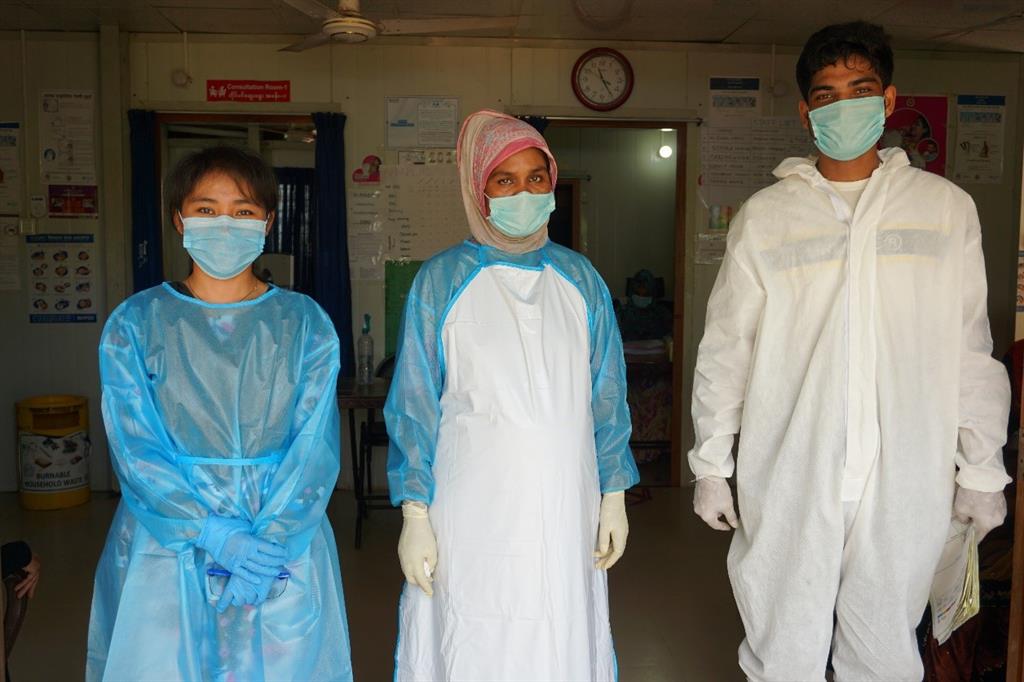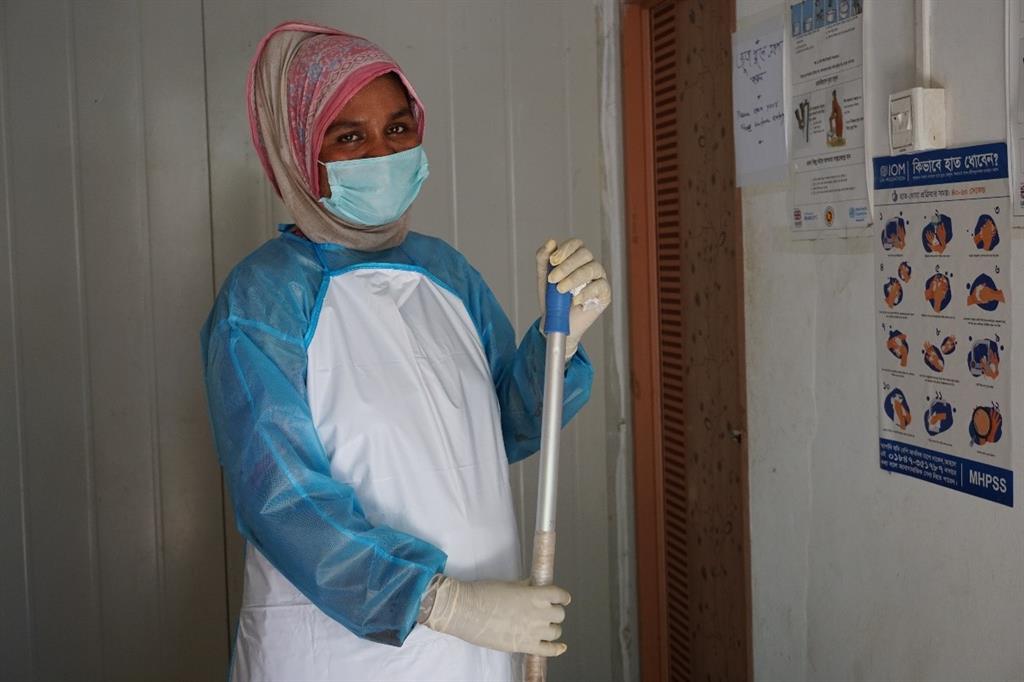The right to water and sanitation was officially declared a human right by the United Nations 10 years ago, in 2010. Since then, every year World Toilet Day creates the momentum to celebrate the critical role of Water, Sanitation and Hygiene (WASH) initiatives in upholding progress towards the achievement of universal health coverage and the attainment of Sustainable Development Goals 3 (Good Health & Wellbeing) and 6 (Clean Water and Sanitation).
In Cox’s Bazar, the World Health Organization (WHO) is promoting WASH tools and services to enhance equality, inclusion and human rights in the Rohingya crisis while providing a guiding light for safe and hygienic toilets for all in the COVID-19 emergency response.
“WASH always seemed to be a completely different working area, and at first I didn’t see myself engaging in such activities”, starts Samira Chakma, Medical Assistant at IOM Health Post in camp 23. “But my perception has changed since my participation at the WHO WASH FIT training in August this year”, she concludes.

A Medical Assistant in the Rohingya refugee camps, in Cox’s Bazar, since almost three years, Samira Chakma became a WASH enthusiast after participating in WHO WASH FIT training. WHO Bangladesh/Tatiana Almeida
It has been three years since Samira Chakma started working at the Cox’s Bazar Rohingya refugee camps. In August, she participated in the WHO Water and Sanitation in Health care facilities Improvement Tool (WASH FIT) training where she became enthusiastic about WASH initiatives.
“I was marveled by the many things I learned at the training. For instance, I didn’t know that a handwashing station had to be within 5 meters from the toilet, that the water pipes outside the facility had to be protected nor that every 6 months the water should to be tested”, recalls Samira.
Since her participation in the WASH FIT training, Samira and her team installed a handwashing station and a gate for the water pipe line; closed the open sewer; and created a waste management and cleaning system with a dedicated supervisor. Currently, they are planning to initiate water quality testing.

A midwife at IOM Health Post, Marina Akter using the handwashing station before attending to the labour of a 27-year-old Rohingya woman. WHO Bangladesh/Tatiana Almeida
“Implementing WASH FIT in our health facility has brought our team together, our goal is to keep COVID-19 and other infectious diseases at bay. We were also worried for our cleaner Fathema Akter, but our facility has become a safer, more accessible and a dignified place for all of us health care workers and patients”, tells Samira.
“Many infectious diseases are easily transmitted when people have inadequate access to water and sanitation, which unfortunately is the reality of many refugees in Cox’s Bazar. WHO has been supporting health care facilities at different levels of the COVID-19 response by providing training, technical know-how, logistics, medicines and supportive supervision”, says Dr Ssentamu Simon Kaddu, WHO Public Health Response Consultant.
A continuous improvement framework, the Water and sanitation for health facility improvement tool (WASH FIT) is a practical guide for improving quality of care through water, sanitation and hygiene in health care facilities. WHO provides a 4-day training which includes field visits with participants drawing action plans for improvements in general IPC, WASH and health care waste management at their respective facilities.

Samira Chakma with her team at IOM Health Post. At the center, cleaner Fathema Akter is 8 months pregnant. WASH FIT has been important to make her workspace safer during the pandemic. WHO Bangladesh/Tatiana Almeida
To achieve the safest outcomes for patient health, sanitation must be accompanied by interventions like infection prevention and control and clinical health care waste management. WHO, together with the IPC technical working group, conducts regular supervisory visits to health facilities including the COVID-19 specialized Severe Acute Respiratory Infection and Isolation and Treatment Centres (SARI ITCs). A monthly IPC score card system helps SARI ITC staff document and keep track of their IPC tasks and achievements. By filling the score card areas for improvement, staff can easily identify and address key achievements.
In addition to the SARI ITCs, between September and October 2020, 150 health facilities from 34 camps and host communities have been assessed against WASH FIT indicators. Among these, 49% needed improvements in safe and enough water supply whereas 57% needed improvements in sanitation. Notably, 90% of the health facilities had low risk of likelihood of faecal contamination of water sources.
To date, over 200 health professionals from 179 health care facilities in Cox's Bazar have been trained on WASH FIT. During the COVID-19 outbreak, WHO has also conducted WASH FIT assessments at 18 Severe Acute Respiratory Infection Isolation and Treatment Centres (SARI ITCs), including the High Dependency Unit/Intensive Care Unit at the 250 Bed District Sadar Hospital in Cox’s Bazar.
“Health goals cannot be achieved without a strong focus on quality of care including water, sanitation and hygiene in health care facilities. By providing health facilities with the tools to continually improve the availability and quality of essential WASH conditions, including safe toilets, clean water and handwashing stations, we are helping stop the spread of deadly infectious diseases such as COVID-19 while keeping patients and staff safe. By doing so at the world’s largest refugee camp, we are making sure to leave no one behind”, says WHO Head of Sub-Office, Dr Kai von Harbou.

An important part of the WASH FIT successful implementation at her health facility, Fathema Akter is contributing to creating a safe and clean environment. WHO Bangladesh/Tatiana Almeida
The WASH FIT implementation at the IOM Health Post in Camp 23, in Teknaf, serves 11 000 Rohingya refugees and 3884 patients from the host community to whom this health post is the nearest health care facility.
